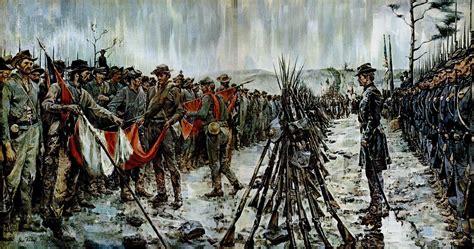The Value of Respect

At the end of the Civil War at Appomattox Courthouse, General Robert E. Lee met with General Ulysses S. Grant to secure the conditions of surrender. After Lee had secured the conditions beneficial to his men it was required that every member of the Army of Northern Virginia was to surrender to union forces. Of all the officers of general rank that Grant had to give the honor of receiving the surrender to. He chose Brevet Brigadier General Joshua Lawrence Chamberlain a Medal of Honor winner at the Battle of Gettysburg. Chamberlain requested that in addition to his current unit that the Maine unit he commanded at the Battle of Gettysburg also be allowed to take the surrender. The request was granted.
The Army of Northern Virginia arrives to give their surrender and receive their parole. Given the viciousness of the war and number of dead on both sides, one can only imagine what the surrendering confederate soldier would be feeling. The condition of the Army of Northern Virginia is horrific. They have been harried for weeks with little or no sleep. The army is starving. Many of the soldiers are down to eating shoe leather. Leading the surrendering army is a Georgian cavalry officer named General John Gordon. He is mounted on a white horse. Chamberlain calls his men to attention and orders present arms. The rifles of the union soldiers crack in salute. General Gordon recognizing the gesture and the fact that the union soldiers are not jeering his men, gallantly wheels his horse and returns the salute by dipping his sword. Later as the men intermingle Chamberlain overhears several southern soldiers comment on the gesture saying that had the roles been reversed, they doubted that they would have treated the union soldiers with the same respect.
Years later Joshua Lawrence Chamberlain writes a book called "The Passing of Armies" in which he describes the final months of the civil war including the surrender. The book sets off a firestorm of criticism by those who feel that reconstruction is to good for the secessionist states and that Chamberlains gesture was inappropriate. General Gordon upon hearing of the controversy writes and editorial article in a local newspaper calling Chamberlain one of the knightliest soldiers in the union army.
Treating each other with respect, even people with whom we disagree with or are enemies with can go along way. Showing ones quality might just get you allies from unexpected quarters. One never knows who might come to your aid because of the example have you set.
We are 100% funded for October.
Thanks to everyone who helped out. 🥰
Xephula monthly operating expenses for 2024 - Server: $143/month - Backup Software: $6/month - Object Storage: $6/month - SMTP Service: $10/month - Stripe Processing Fees: ~$10/month - Total: $175/month
- Art
- Causes
- Crafts
- Crime
- Dance
- Drinks
- Film
- Finance
- Fitness
- Food
- Jeux
- Gardening
- Health
- Domicile
- Literature
- Music
- Networking
- Paranormal
- Autre
- Politics
- Stories
- News
- Party
- Science
- Religion
- Shopping
- Sports
- SyFy
- Politically Incorrect
- Philosophy
- Theater
- Technology
- Wellness



